My Grandfather's Heaven
Stefan Hertmans made his debut in the early 1980s as an author of experimental prose. Already his early poetry was in the tradition of modernism, with Gottfried Benn, Paul Celan and Georg Trakl as role models. By the end of the 1980s, Hertmans was regarded the leading representative of postmodernism in Flanders. Besides prose and poetry, Stefan Hertmans has also made a name for himself as a playwright and essayist. Hertmans's recent works are bestsellers.
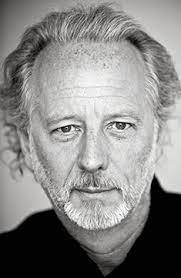
Since the publication of Oorlog en terpentijn [War and Turpentine] (2013; AKO Literature Prize, 2014), Stefan Hertmans has been considered to be one of the most successful authors of the Dutch-speaking world. He has received a whole series of awards for his work, including the Constantijn Huygens Prize for his oeuvre in 2020, and, being a " truly European writer" (Literaturpreis Leuk, 2017), the international Swiss literary prize Spycher: Literaturpreis Leuk in 2017.
Stefan Hertmans' work did not conquer the German market overnight. In 1995, his text for four voices Kopnaad was translated (and entered added to the theatre titles of S. Fischer), but ultimately did not go on sale in bookstores. In 1998 the play was broadcast as a radio play (rebroadcast in 2008).
To Merelbeke
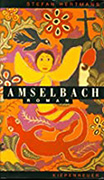
In 1997, three years after its publication in the Dutch language area, the translation of Naar Merelbeke was published by Kiepenheuer under the title Amselbach.
The German press was rather sceptical about this "phantasmagorically defamiliarised childhood story" (Internationales Literaturfestival Berlin, 2017). According to the Neue Zürcher Zeitung, Hertmans' approach of the past was "not bold enough" (Diekmann, 1997) and in the Frankfurter Allgemeine Zeitung Helmuth Kiesel wrote that he appreciates the many passages with "great suggestive power" (Kiesel, 1997), but that the book as a whole still failed to convince him:
“The stimulatingly colourful initial conditions and motivations of a poet's existence are brought to life in thirty-eight small chapters, which are connected to each other by several series of motifs, in a comedic and thoroughly engaging way. This is amusing and in some respects certainly worthy of consideration; but that one misses a lot if one does not read it should not necessarily be asserted here - with all due respect for Hertmans' fabulist art." (Kiesel, 1997)
Amselbach was not a success. Stefan Hertmans still has to wait for his breakthrough in the German language area.
Vienna
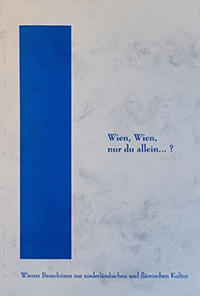
“Cities, like people, can be recognised by their gait”. With this sentence Stefan Hertmans opened the chapter "Vienna" in the anthology Steden [Towns], on which he worked in 1997 while staying in the Austrian capital as a writer in residence and teaching Viennese students of Dutch. During his stay the chapter on Vienna was translated into German, but the translation did not go on sale.
"And because there was nothing to be done, and because he had nothing to say, he understood that he was faced with a new task: to accept without any kind of plan the next hour, the next day, the next week, the next month - to live without the hallucination of a plan." (Hertmans, 1998)
Stefan Hertmans experienced an exciting and creative time in Vienna, it would have been an obvious choice for the the anthology he worked on during his stay to also have been published by an Austrian publisher. Unfortunately, this plan that had to be abandoned.
Scardanelli
"The fool always wants to try anew
whether it would not be better to learn
from his uselessly repeated mistakes."
(Hertmans, 2001)
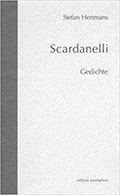
In 2001, the first poems by Stefan Hertmans appeared in German translation with the publishing house Athena in Oberhausen. The translator was Heinrich G.F. Schneeweiß, who by then had already translated the poetry of a whole series of famous Dutch-language poets: Sybren Polet, Gerrit Kouwenaar, Cees Buddingh', Bert Schierbeek, Remco Campert, Simon Vinkenoog, Herman de Coninck, Guido Gezelle, Lucebert, etc.).
Actually, Athena is a publishing house for specialist literature from the broad spectrum of the humanities and sociology. The number of Athena's literary titles is rather small. They primarily publish works by young German-language poets but occasionally also translations from other literatures. It was therefore an honour to be included in the Athena fund, although the audience was small.
This applies all the more to the second anthology of translated poems by Stefan Hertmans. Only 36 copies of Giottos Himmel, a bilingual edition with etchings by Karel Dierickx and poems by Stefan Hertmans, were published. Each copy was accompanied by three etchings numbered and signed by the artist, and a manuscript by Stefan Hertmans. (Stefan Hertmans reads poems from Giottos Himmel)

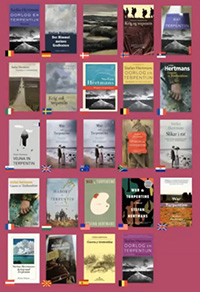
Translations of 'Oorlog en terpentijn'
My Grandfather's Heaven
In 2013, Hertmans published Oorlog en terpentijn [War and Turpentine], based on the diaries of his grandfather who had fought in the First World War. As is usually the case with Hermans, he did not limit himself to the story of his grandfather. Oorlog en terpentijn is also a book about the role and significance of history and art, and, last but not least, it is also a love story. The book left no one unmoved and won one prize after another. The work was awarded among others the AKO Literature Prize and the prestigious Flemish Culture Prize for Literature.
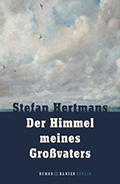
The international interest in the book was considerable, not in the least because of the "tragic Jubilee" (Naegelen, 2014) of the centenary of the First World War. In order to sell the translation rights, even a kind of auction was organised. For the German-speaking region, Hanser finally won the bid. Der Himmel meines Großvaters appeared in 2014 in translation by Ira Wilhelm, who had previously translated Hertmans' poetry for the anthology Keine triste Isolde (2007). Expectations were high, as evidenced by the fact that the Neue Zürcher Zeitung reported on the book being award the AKO Literature Prize even before it hit German bookstores.
"More tenderly, more touchingly, has a recognition, a bridging of the ages rarely been staged." (Seibt, 2014) writes the Südddeutsche Zeitung; Deutschlandfunk finds the book important addition to the "collective history" (Schumacher, 2014) and for the TAZ Der Himmel meines Großvaters is not only a "beautiful and informative book" but also a book from which Germans can learn something about their relationship with the "history of the past century" (Wackwitz, 2014). In Deutschlandfunk, the book was presented as "a difficult and highly successful exercise in trying to understand how an average Flemish person experienced the First World War". (Mühleis, 2015)
Despite these positive reactions, Der Himmel meines Großvaters escaped notice in the German-speaking world. While the book sold like hot cakes in the Dutch-speaking world, it stayed on the shelves in German bookshops. There was no second edition.
War and Turpentine
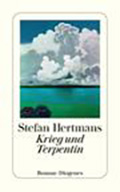
This did not change much either, when publisher Diogenes republished Ira Wilhelm's translation four years later (the book had been on the Booker Prize longlist the year before). The metaphorical title Der Himmel meines Großvaters, was exchanged for a literal translation of the original title Krieg und Terpentin.
Krieg und Terpentin was generally well received:
War and Turpentine "makes for an unforgettable reading, is an anti-war novel and a contemporary testimony as well as a touching book about a simple man and a tribute to the relationship between grandfather and grandson." (Vom Schmerz, 2018)
But the number of reviews for this book, which was received as a "future classic" (the Guardian) in the English-speaking world and listed as one of the 10 best books of the year 2016 in the New York Times, remained rather limited. (See also.) Did this have something to do with the topic of war? Was Yuri Naegelen perhaps right when he wrote:
“Above all, the reader must be aware of one thing: Even though Oorlog en Terpentijn is for the most part a book worth reading, it will never find a place in the canon of the most important war literature. And the reason for this is that Oorlog en Terpentijn is first and foremost a work that tells the story of a human, and only secondarily a book about the Great War.” (Naegelen, 2014)
If this is true, perhaps it would have been better to stick to the first title. Doesn't Der Himmel meines Großvaters better reflect the tension between reality and art, love and hate, that defined the life of Hertman's grandfather and carries Hertman's book?
Even if one has good cards, as did War and Turpentine, the transfer of a book to another language area remains a difficult matter. Success in the homeland by no means guarantees success abroad.
Tenderness and violence (Linden, 2017)
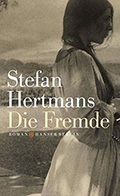
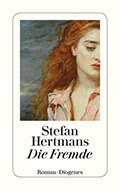
In 2017, the German translation of De bekeerlinge [The Converted] (2016) appeared under the title Die Fremde with Hanser in Munich. For her "exceedingly reflective, very demanding and sovereign" (Bach, 2019) work Ira Wilhelm was awarded the Else-Otten-Preis in 2018.
In Die Fremde, Hertmans tells the story of a woman who leaves her family and converts to marry the son of a Rabbi: a fateful decision. They can not find a sanctuary and eventually the family falls victim to a progrom of the Crusaders.
Die Fremde attracted attention. Not only because it is a "captivating reading " (Löffler, 2017) but also because the book is a mirror of "our contemporary world of migrants " (Löffler, 2017).
When Die Fremde appeared in Germany, the attacks in Paris and Brussels were still fresh in the minds. The trail to the perpetrators of the attacks led among other places to Molenbeek, a quarter of Brussels that Stefan Hertmans knows well.
As a witness, he was in great demand for interviews. As early as 2015, Stefan Hertmans was asked for his opinion on the situation in Brussels (Bartels, 2015). During this time, Stefan Hertmans became a household name.
"Europe must strive to attain a positive attitude again and give people hope. Populists have no answer to the important questions except agitation and hatred.” (Hertmans, 2018)
The pendulum of the world
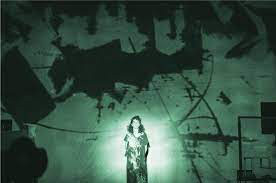
'Antigone' - Lessingtage
The pendulum of the world is the heart of Antigone (Marguerite Yourcenar)
Under this motto, Stefan Hertmans adapted the Greek tragedy Antigone in 2016/2017 and moved the story to Molenbeek. The play which, like Kopnaad, was included among S. Fischer's theatre titles, was translated into German by Ira Wilhelm and first performed on 30. September 2017 in Münster (Directors Carolin M. Wirth and Carsten Bender). Five years later, the story of Nouria, who wants to bury the corpse of her brother who fought for the IS and died in an attack, is part of the programme of the digital Lessingtage of the theatre network mitos21. The name Stefan Hertmans is now definitively closely linked to the debate on terrorism, migration and European identity.
Schloss Bellevue
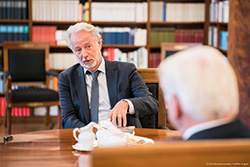
It was thus no coincidence that Stefan Hertmans was invited to Schloss Bellevue in 2017 to talk to the German Federal President about identities and forms of cohabitation in countries of immigration,
This meeting in turn led to the invitation to talk at the Frankfurter Buchmesse in 2018, the year that Die Fremde was published, together with the Croatian writer Ivana Sajko and Federal President Frank-Walter Steinmeier about the topic of 'How we defend freedom in turbulent times’. (#Fairs)
The Rise
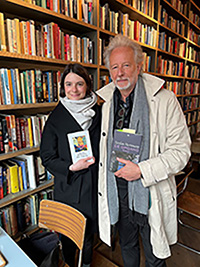
In Gent with Stefan Hertmans (Ⓒ Diogenes)
In 2002, Hertmans' Der Aufgang was published, no longer with Hanser but Diogenes, where a reissue of Die Fremde had previously appeared. Der Aufgang is a portrait of another era, this time the Second World War. The main character is the Flemish SS man Willem Verhulst, who betrays his compatriots during the war. Opposite Verhulst is his wife Mientje, a convinced pacifist.
“The result is a clever literary reconstruction that never pretends to know everything” (Geiger, Hertmans, Krohn, 2022)
The book is discussed on various radio stations and will soon appear on the bestseller lists. (WDR, Rbb, SWR-Bestenliste place 6).
The polyphony of this book, which at times reports soberly, chronologically, at times narrates densely, atmospherically, and at other times quotes from files and diaries diversifying the drama, makes the story a remarkable and readable novel. (Kugler, 2022)
According to Sigrid Löffler, Stefan Hertmans presents himself as a new W. G. Seebald with Der Aufgang. The "Stylistic image" (Löffler, 2017) of Seebald is clearly recognisable, but, according to her, Hertmans refines it "to Enlightenment Art " (Löffler, 2017). A greater compliment is barely conceivable.
(Herbert Van Uffelen)
References
Bach, Bettina; Wunschel, Annette; Missinne, Lut: Juryrapport - Else-Otten-Preis 2018. In: Filter, Issue: 20.05.2019 - Utrecht : Stichting Filter, (2019).
Bartels, Gerrit: Zur Person: "Schaffen wir's nicht, schafft's keiner in Europa." Der belgische Schriftsteller Stefan Hertmans über die Lage in Brüssel und die Kompromissvirtuosität seiner Landsleute. In: Der Tagesspiegel, Vol.: [25.11.2015] - Berlin, (2015) - p. 19.
Dieckmann, Dorothea: Der Duft der Rosskastanie - Stefan Hertmans' Roman 'Amselbach'. In: Neue Zürcher Zeitung, Issue: 19/20 July, (1997).
Hertmans, Stefan: Medien zeigen Deutschland zu negativ. In: Frankfurter Allgemeine, Issue: 10. nov., (2018).
Hertmans, Stefan: Steden, Amsterdam, (1998) - p. 142.
Hertmans, Stefan: Scardanelli – Gedichte, Athen, Oberhausen, (2001) - p. 50.
Internationales Literaturfestival Berlin., 2017 (https://literaturfestival.com/authors/stefan-hertmans/)
Kiesel, Helmuth: Kleines gelbes Dreieck. Flämische Epiphanien: Stefan Hertmans hatte eine Dichterjugend. In: Frankfurter Allgemeine Zeitung, Issue: 16. apr., (1997).
Kugler, Hansruedi: Die Pazifistin und der Nazikollaborateur – Stefan Hertmans gräbt im Roman «Der Aufgang» eine erschreckende Familiengeschichte aus. In: Tagblatt, Issue: 28. apr., (2022).
Linden, Thomas: Zärtlichkeit und Gewalt. In: Kölnische Rundschau, Vol.: [15.03.2017] - Köln, (2017).
Literaturpreis Leuk für Stefan Hertmans. In: Südddeutsche Zeitung, Issue: 7. jul., (2017) - p. 14.
Löffler, Sigrid: Stefan Hertmans: "Die Fremde" - Erschütternde Geschichte einer Flucht. In: Deutschlandfunk Kultur - Köln, 23. März, (2017).
Löffler, Sigrid: Stefan Hertmans: "Der Aufgang". In: Deutschlandfunk, 13. Mai 2022 (www.deutschlandfunk.de/stefan-hertmans-der-aufgang-dlf-17dbbee4-100.html)
Mühleis, Volkmar: Stefan Hertmans "Der Himmel meines Großvaters" - Ein flämischer Jedermann im Ersten Weltkrieg. In: Deutschlandfunk, Issue: 24. jun. - Köln, (2015).
Naegelen, Yuri: Bilder von Leben und Tod. In: Literaturkritik.de, Issue: 5. aug. (2014).
Schuhmacher, Katrin: Stefan Hertmans - Glaube, Liebe, keine Hoffnung. In: Deutschlandfunk Kultur - Köln, 2014
Seibt, Gustav: Krieg und Terpentin - Stefan Hertmans erzählt vom 20. Jahrhundert aus belgischer Perspektive. In: Süddeutsche Zeitung, Issue: 16. nov. (2014).
Geiger, Thomas; Hertmans, Stefan; Krohn, Anne-Dore: Stefan Hertmans: Der Aufgang. In: In rbbKultur, 28.5.22
Vom Schmerz – Stefan Hertmans „Krieg und Terpentin“. In: ZEICHEN & ZEITEN, Issue: 14. juli (2018).
Wackwitz, Stephan: How long life can get - Flemish author Stefan Hertmans describes a life in the 20th century: " My Grandfather's Heaven". His book, as beautiful as it is instructive, is still to be discovered in Germany. In: Die Tageszeitung, Issue: 16. nov. (2014).
